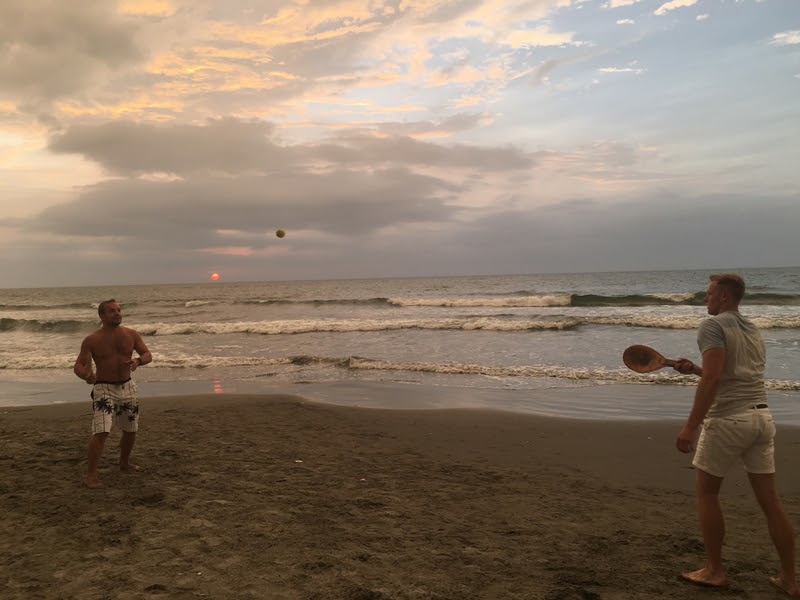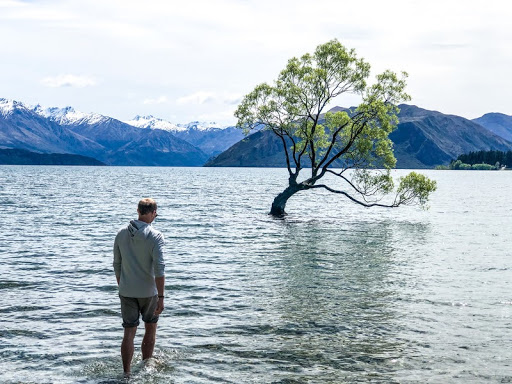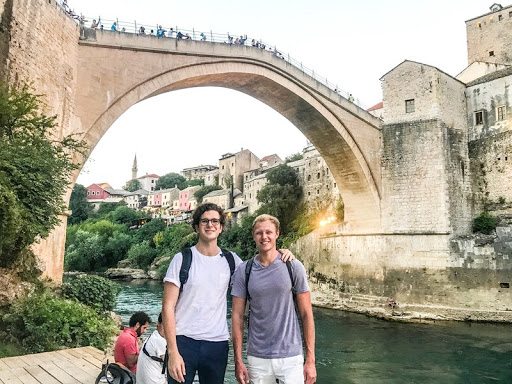1. Hey, can you please introduce yourself?
Hi, I’m Calvin! I’m the Founder of Life Reimagined, an organization dedicated to helping 10 million people live a more fulfilling life. I’m also the Director of Business Operations at Mechanism Ventures, a startup studio that helps founders fund, launch, and scale companies.
I grew up with a single mom who made $12,000 a year, so I spent my early life figuring out how to improve my circumstances. I ended up with a full scholarship to Princeton University and graduated with a degree in public policy.
After spending my first year out of college on Wall Street as an M&A banker, I joined Toptal in a fully remote growth marketing role. That experience hooked me on remote work, and I never looked back. I spent the next few years growing Toptal, leading teams, and traveling to 35+ countries. I recently stopped traveling to settle in Southern California.
Now, I spend most of my time writing, podcasting, surfing, and helping early-stage startups with growth and operations.
2. What motivated you to choose remote working?
I stumbled into remote working early in my career. After college, I joined an investment bank to find my financial footing. I enjoyed the steady paycheck, but I really didn’t like spending 15 hours a day in a cubicle doing grunt work. I knew there had to be more to life, so I planned an escape from the cubicle.
While looking at different career options, I spoke with a good friend who had been traveling around the world while working remotely for a technology startup. His work and life sounded exciting, so I explored roles with the company and ended up landing a remote position as a growth marketer at Toptal.
After an awesome first week of onboarding with my boss in Cartagena, Colombia, I realized that I could travel and still be incredibly productive. So I moved out of my apartment in New York and traveled the world while working remotely for 4 years.

I’m grateful I fell into the remote working model. It aligns with how I prefer to work and live, and it has accelerated my personal and professional growth. And in being able to design life on my terms, I’ve felt more consistent levels of joy and fulfilment.
3. What were your initial months like? Did it live up to your expectations?
My first few months were incredible. I left New York City and got a beach-front apartment in Cartagena, Colombia with my best friend from college. We spent the next 6 months traveling through South America and living like kings for half the price of my life in New York.
I also found my work incredibly interesting. I was learning the fundamentals of growing a business, and within a few months, I was managing tens of thousands of dollars in ad spend, managing a small team, and getting paid very well. The autonomy, pace, and practical nature of growth marketing work felt so much better than investment banking. I was also reading books like a maniac for the first time in my life, and I grew a lot through doing so.
I felt more joy and gratitude during that initial period of remote work than any other point in my life. What’s funny is that I was working as hard as I did as a banker. I was just doing it more on my terms and had amazing experiences on the weekends to keep me recharged.
4. How did you find remote working roles?
I got lucky. I didn’t really know remote working existed or that it would be something that I enjoyed so much. I was just looking to join a startup, and the role I found at Toptal happened to be fully remote. I really enjoy the experience of working remotely. It’s hard to imagine going back to an office.
Since that first role, I’ve changed jobs a few, but I still work with many of the people I met at that first company. When you find your tribe, stick around them. It makes more work fun.
5. What have been the best, good and worst aspects of remote working for you?
Remote work has allowed me to design life on my terms. So whether it’s exploring my interest in traveling the world, surfing in the mornings, or napping in the afternoons, I’ve had the flexibility to build the life that works best for me. On the whole, that’s allowed me to build a more fulfilling life.
One area where I’ve struggled is creating separation from work. When you go in and out of an office, there’s a natural separation between home life and work life. With the flexibility of remote work, I can open up my laptop and work at any point in the day. So while I can enjoy an afternoon nap or workout without anyone shaming me, I also find myself working at ten or eleven at night from my couch. I still haven’t found a good way to shut off entirely.

6. What tools do you swear by while working remotely?
With tools, I keep it very simple. I get the majority of my work done with Google Suite applications, Slack, Zoom, and written or digital to-do lists. I use Dynalist to organize my digital notes, but I’m thinking about switching over to Coda. For taking notes on calls and brainstorming, I enjoy using a pen and paper.
7. Your most exciting/ hilarious experience since you started working remotely.
I’ve really enjoyed bringing on friends to work with me at companies. In 2018, I hired one of my best friends to be my number two. I convinced the company to fly him to Croatia to meet me for onboarding. We spent the next month onboarding him to the role while cruising through Croatia, Montenegro, Bosnia, Serbia, and Hungary.
Getting to travel the world and work with your best friends is so much fun. It adds a lot of meaning and joy to work, and I wouldn’t trade those experiences for anything.

8. What is your golden advice to a new remote worker?
Try not to get paralyzed by information overload. Slack, Zoom, Trello, and other companies have made digital communication and collaboration frictionless and cheaper.
While these tools enable seamless remote work, they also come with lots of messages and alerts that can make it easy to get overwhelmed with information. The speed of information can be overwhelming, and in some cases, paralyzing. So finding a way to filter through the noise and focus on what’s truly important is an incredibly valuable skill for the long-term.
9. How do you see your career shaping up and your goals?
My mission in life is to help 10 million people live a more fulfilling life. There are many ways to get there, and I’m not sure what the path will look like. With my career, I have stopped following a particular narrative. I try to make sure I enjoy the projects I’m working on, or at the very least, that I’m building skills or connections that will serve me throughout my life.
Right now, I’m focused on my job as the Director of Business Operations at Mechanism Ventures. It’s exciting work. I support very early-stage startups in our portfolio with growth, operations, and hiring projects. In the last year, I’ve been working with a company dedicated to improving youth nutrition and another company that’s helping students reduce their debt. I love the learning, diversity, pace, and impact of this work.
Outside of my “day job,” I’m focused on growing the impact of Life Reimagined, the organization I started in late 2017 to help people improve the quality of their lives. At the moment, I’m spending a lot of time figuring out how to make my website, podcast, newsletter, and scholarships more helpful for people.
I’m not sure where all of this will take me. I focus on doing my best to enjoy the day to day and help other people so that I won’t end up on my deathbed with too many regrets.
10. How do you expect remote working to evolve in the future?
While it’s still too early to tell, the pandemic seems to be accelerating the adoption of remote work. Practically speaking, I think this means that there will be more remote opportunities that pay well, offer career growth, and provide the flexibility to design life on your terms.
These opportunities will be scooped up by smart, motivated, and capable people who don’t want the constraints of the 9 to 5 office arrangements. This trend will accelerate as social norms shift and technological progress further erodes the necessity of being in an office.
One big gap with the current remote working model is the lack of companies focusing on community and connection. Remote work can be isolating, and I think entrepreneurs need to find new ways to help combat that isolation, which isn’t good for individuals or society. I expect that you’ll see more high-quality coworking spaces, coliving experiences, and in-person events that help people feel a sense of belonging, regardless of where they are in the world.
11. Where can we follow you on?
The best place to connect with me is through my weekly newsletter. It’s a direct line to me and everything I’m doing.
Every Sunday, I share articles, ideas, and podcasts designed to help people improve the quality of their lives. I have a lot of fun engaging with readers, so if you join, definitely reach out!
You can also connect with me on LinkedIn (let me know you read this interview) and Twitter (I’m new here, so still figuring it out).
Are you a remote worker too?
Would you like to share you story?
Just reach us at hrishikesh@remote.tools!